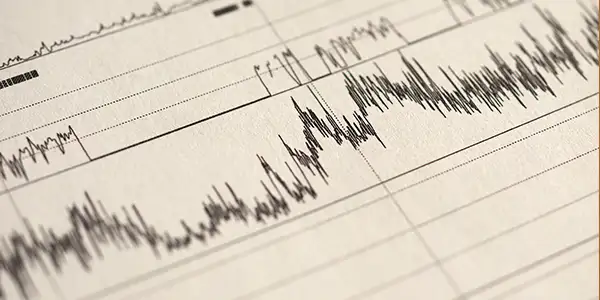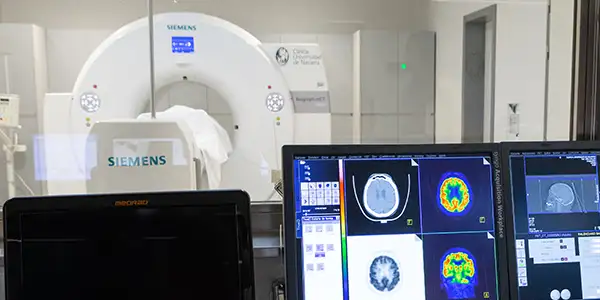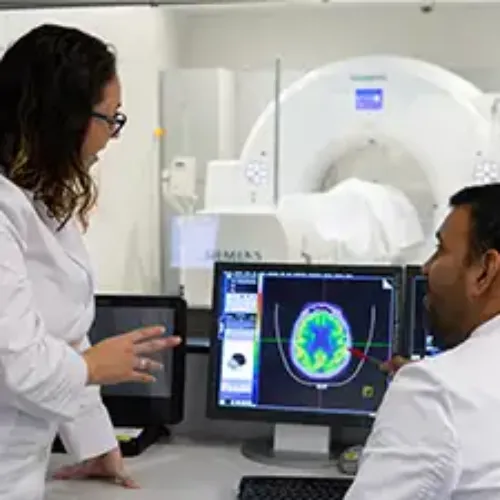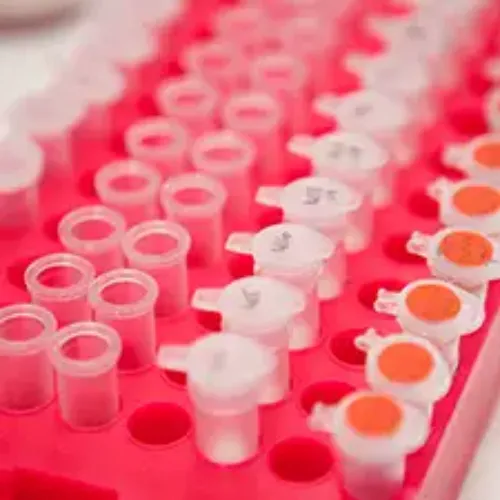Epilepsy Unit
"We pay special attention to drug-resistant epilepsy, which is difficult to manage, in order to find the best therapeutic alternative and improve the quality of life of patients".
DR. ASIER GÓMEZ.
SPECIALIST IN NEUROLOGY
Why at the Clínica Universidad de Navarra
We are the best private hospital in Spain for the ninth year in a row
(Ranking Monitor de Reputación Sanitaria 2023)
Speed
We make an accurate diagnosis and determine the treatment in the shortest time possible. No waiting lists.
Experience
The Epilepsy Unit has a highly specialized interdisciplinary team that ensures a comprehensive medical care of the patient.
Efficiency
The center of our care activity is the patient. Everything is coordinated to achieve maximum efficiency with excellent care.
Technology
We have the most advanced technology and work with well-defined diagnostic protocols to offer the best solution to our patients.
Cutting edge technology for the best diagnosis
In the Epilepsy Unit of the Clinica Universidad de Navarra, both at its headquarters in Madrid and in Pamplona, we have the most advanced technology for a comprehensive knowledge of the structure and function of the brain and to offer the most accurate personalized diagnosis.

Monitoring with video-electroencephalogram
It is the only test that allows observation of the epileptic seizure and obtains the recording of changes in the electroencephalogram while the crisis occurs. It is achieved with monitoring in a video-EEG unit with patient admission.
The video-EEG system records the image of the patient synchronized with the digital recording of electroencephalographic activity. It allows differentiation of epileptic seizures from non-epileptic and helps locate the epileptic focus.
Monitoring is indicated for the diagnosis and classification of seizures, as well as for the pre-surgical study in patients susceptible to surgery.

Tests of
neuroimaging
They allow the identification of brain lesions that may be causing epilepsy.
We have high field magnetic resonance equipment (3 Tesla MRI) that allows us to perform a detailed and high quality study of the brain areas.
Likewise, we have PET and brain SPECT to obtain a functional image of the brain activity that helps to identify the focus where epilepsy is generated.
Treatments in the Epilepsy Unit
La Clínica Universidad de Navarra cuenta con un programa quirúrgico de epilepsia para dar solución a los pacientes que no responden a tratamiento farmacológico, ya que en algunos casos una cirugía puede conseguir eliminar o reducir significativamente el número de crisis.
There are numerous antiepileptic drugs. The choice is aimed at achieving maximum effectiveness and the least side effects according to the individual characteristics of each patient.
This treatment should be monitored periodically.
In the Clinica Universidad de Navarra we have the best experts for this, including a specialized nursing team, for the follow-up of the disease.
It requires a highly specialized hospital center such as the Clínica Universidad de Navarra, where there is a multidisciplinary team, made up of neurologists, neurosurgeons, neurophysiologists, radiologists, specialists in Nuclear Medicine, psychiatrists and highly specialized nurses.
The team carries out the selection of the surgical candidate through pre-surgical evaluation with videoEEG monitoring, 3Teslas structural and functional magnetic resonance imaging, Nuclear Medicine studies and even invasive monitoring with intracerebral electrodes. The objective is to identify the brain area that produces the crises and evaluate the possibility of surgical resection to eradicate the crises and not leave any sequelae.
According to the findings of the pre-surgical evaluation, there are two surgical options:
Resective surgery: It consists of removing the brain tissue that causes the seizures, with the aim of eliminating the crises.
Functional surgery (stimulation of the vagus nerve): in case it is not possible to perform resective surgery, a device can be implanted on the vagus nerve, called vagus nerve stimulator, which, through the nerve, modulates the brain epileptiform activity, can reduce the frequency and severity of the crisis.
When the patient does not respond to pharmacological treatment and is not a candidate for surgery, other options aimed at improving the patient's quality of life can be studied, such as the ketogenic diet. This is to follow a special diet that has proven effective in some types of epilepsy, for this we have the support of a nutritionist who is responsible for designing and monitoring patients together.
In addition, some patients have cognitive impairments associated with epilepsy such as memory loss. We have a team of neuropsychologists who study the patients cognitively and perform personalized treatments through a cognitive stimulation program with face-to-face and online sessions at home.
- Ketogenic diet: it consists of following a special diet that has proven effective in some types of epilepsy, for this we have the support of a nutritionist who is responsible for designing and monitoring patients together.
- Cognitive stimulation: memory and attention problems are very common in people with epilepsy, so, along with our team of neuropsychologists, we offer a program of detection and treatment of them.
DIAGNOSIS AND PERSONALIZED TREATMENT
Integral evaluation of epilepsy
The Epilepsy Unit of the Clinica Universidad de Navarra has specialists in different areas and with the most specific, modern and precise diagnostic methods.

Cutting edge technology
We have the latest technology and work with well-defined diagnostic protocols to offer the best solution to our patients.

Comprehensive treatment of symptoms
We perform cognitive stimulation for memory problems as well as a psychological support program for the treatment of depression and anxiety that may appear.

Research and clinical trials
We continue to seek solutions to cure epilepsy or improve the quality of life of our patients, we investigate the use of new drugs.

Why at the Clinic?
- Integral evaluation of the patient.
- Personalized diagnosis.
- Cutting edge technology.

















